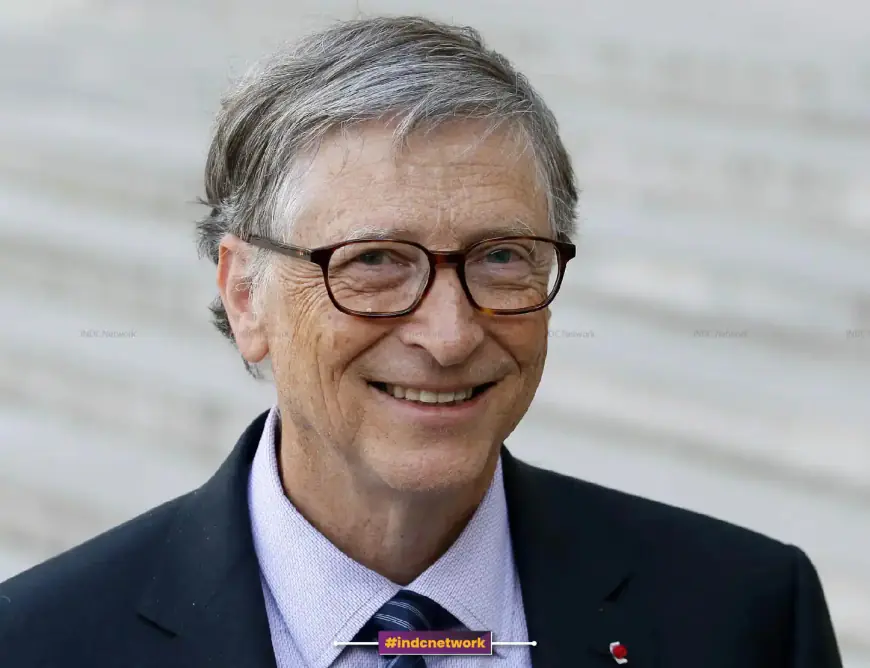From College Dropout to Tech Titan: How Bill Gates Built Microsoft and Shaped the Future
Bill Gates, the co-founder of Microsoft, transformed the personal computing industry and became a global icon for innovation, philanthropy, and wealth. This article explores his journey from a college dropout to the leader of a tech empire and a champion for global change.

INDC Network : Biography : From College Dropout to Tech Titan: How Bill Gates Built Microsoft and Shaped the Future
When we think of technology pioneers, Bill Gates often tops the list. As the co-founder of Microsoft, Gates revolutionized personal computing, helping to make computers accessible to millions worldwide. Beyond his role in technology, Gates has also emerged as one of the world’s leading philanthropists, tackling challenges like global health and climate change.
This article takes a deep dive into the life and legacy of Bill Gates, examining how he built Microsoft, the impact of his innovations, and his ongoing efforts to improve the world.
Early Life and Influences of Bill Gates
A Precocious Start : William Henry Gates III, better known as Bill Gates, was born on October 28, 1955, in Seattle, Washington. Gates displayed exceptional intelligence and curiosity from an early age. His fascination with computers began in middle school when he gained access to a teletype machine.
The Birth of a Partnership : While attending Lakeside School, Gates met Paul Allen, who shared his passion for computers. The duo started working on software projects together, laying the groundwork for a lifelong collaboration.
Gates later enrolled at Harvard University in 1973, but his entrepreneurial spirit soon took over. He dropped out in 1975 to pursue his vision of a software-driven world with Allen.
Founding Microsoft: The Dawn of Personal Computing
The Big Idea : Gates and Allen founded Microsoft (short for “Micro-Soft,” meaning microcomputer software) in 1975. Their first major breakthrough came when they developed a BASIC interpreter for the Altair 8800, one of the earliest personal computers.
The IBM Deal : In 1980, Microsoft struck a pivotal deal with IBM to provide an operating system for their personal computers. Microsoft acquired QDOS (Quick and Dirty Operating System), adapted it, and rebranded it as MS-DOS.
The partnership with IBM catapulted Microsoft to the forefront of the emerging PC industry.
Windows: A Game-Changer for the World
The Creation of Windows : In 1985, Microsoft launched Windows, a graphical user interface that made personal computers more user-friendly. Windows became a household name and dominated the operating system market.
Windows’ Evolution : The subsequent versions of Windows—Windows 95, Windows XP, and Windows 10—continued to innovate, bringing features like multitasking, the Start menu, and enhanced connectivity. Windows is now the foundation of millions of businesses and personal computing systems worldwide.
Bill Gates as a Visionary Leader
Business Acumen : Gates’ strategic thinking and attention to detail were instrumental in Microsoft’s success. He maintained a hands-on approach to product development while fostering a competitive, innovative corporate culture.
Monopoly Allegations and Challenges : Microsoft’s dominance in the 1990s led to antitrust lawsuits, with the U.S. government accusing the company of monopolistic practices. While the case was eventually settled, it shaped Gates’ public image as a fierce competitor.
The Transition: From Microsoft CEO to Global Philanthropist
Stepping Down : In 2000, Gates stepped down as CEO of Microsoft, transitioning the role to Steve Ballmer. He remained involved as chairman and chief software architect but gradually shifted his focus to philanthropy.
The Bill & Melinda Gates Foundation : Founded in 2000, the Bill & Melinda Gates Foundation has become one of the world’s largest private charitable organizations. Its mission includes eradicating diseases like malaria, improving education, and tackling poverty.
Key Achievements
- Funding global vaccination efforts that saved millions of lives.
- Supporting research into renewable energy to combat climate change.
- Advocating for universal education and access to technology.
Gates’ Continued Role in Technology and Society
Focus on Innovation : Even after leaving Microsoft, Gates remained deeply involved in technology. He has invested in companies working on clean energy, artificial intelligence, and biotech solutions.
Books and Public Advocacy : Gates has authored several books, including The Road Ahead and How to Avoid a Climate Disaster. His writing and public talks inspire conversations about the future of technology and humanity.
The Controversies Surrounding Bill Gates
- Antitrust Battles : Microsoft’s dominance during the 1990s led to allegations of stifling competition. Critics argued that Gates’ aggressive tactics undermined innovation in the tech industry.
- Personal Life Scrutiny : In recent years, Gates’ divorce from Melinda French Gates and his connections with controversial figures like Jeffrey Epstein have brought his personal life into the spotlight.
- Philanthropic Debates : While the Gates Foundation has achieved significant successes, critics question the influence of billionaires in shaping public policy and global health priorities.
The Legacy of Bill Gates
A Pioneer in Personal Computing : Gates’ contributions to technology are unparalleled. By making software accessible and affordable, he helped democratize computing and changed the way people work, learn, and communicate.
A Champion for Change : Through his philanthropic efforts, Gates has demonstrated a commitment to addressing global challenges. His work in public health, education, and climate change has inspired millions.
A Mixed Legacy : While celebrated as a visionary, Gates’ legacy is also marked by controversies and debates about wealth and power. However, his influence on technology and society remains undeniable.
The Future of Bill Gates and Microsoft
Microsoft’s Evolution : Under current CEO Satya Nadella, Microsoft has shifted focus to cloud computing, artificial intelligence, and productivity tools, ensuring its continued relevance in the tech landscape.
Gates’ Vision for the Future : Gates continues to advocate for innovation in renewable energy, disease eradication, and global sustainability. His vision for a better world drives his ongoing projects and investments.
The Legacy of a Tech Icon
Bill Gates’ journey from a college dropout to the co-founder of Microsoft and a global philanthropist is a testament to his vision and determination. Through Microsoft, he reshaped the tech industry, and through his foundation, he seeks to reshape the world.
While his legacy is complex, Gates remains one of the most influential figures of our time, inspiring future generations to think big, innovate, and make a difference.
What's Your Reaction?













































































































































































